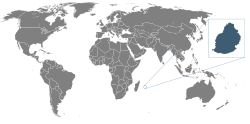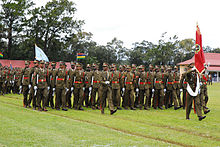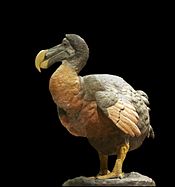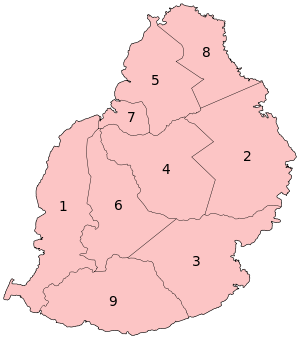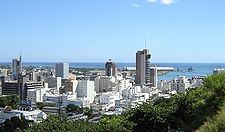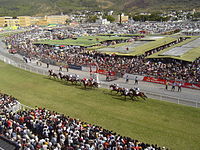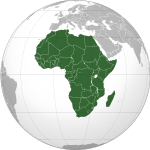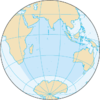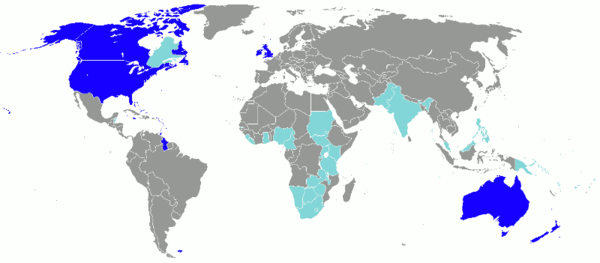- Mauritius
-
Coordinates: 20°12′S 57°30′E / 20.2°S 57.5°E
Republic of Mauritius Republik Moris
République de Maurice

Flag Coat of arms Motto: "Stella Clavisque Maris Indici" (Latin)
"Star and Key of the Indian Ocean"Anthem: "Motherland" Capital Port Louis
20°10′S 57°31′E / 20.167°S 57.517°EOfficial language(s) English[1][2] Vernacular Mauritian Creole
French
English
Rodriguan CreoleDemonym Mauritian Government Parliamentary republic - President Sir Anerood Jugnauth - Prime Minister Navinchandra Ramgoolam Legislature Parliament - Lower House National Assembly Independence from the United Kingdom - Date 12 March 1968 - Republic 12 March 1992 Area - Total 2,040 km2 (179th)
787 sq mi- Water (%) 0.05 Population - 2011 estimate 1,286,340[3] (151st) - 2000 census 1,179,137 - Density 630/km2 (18th)
1,636.5/sq miGDP (PPP) 2011 estimate - Total $19.008 billion[4] - Per capita $14,746[4] GDP (nominal) 2011 estimate - Total $10.299 billion[4] - Per capita $7,989[4] HDI (2010)  0.701[5] (high) (72nd)
0.701[5] (high) (72nd)Currency Mauritian rupee ( MUR)Time zone MUT (UTC+4) - Summer (DST) (DST not observed) (UTC) Date formats dd/mm/yyyy (AD) Drives on the left ISO 3166 code MU Internet TLD .mu Calling code 230 Mauritius
 i/məˈrɪʃəs/ (Mauritian Creole: Moris; French: Maurice, pronounced: [mɔˈʁis]), officially the Republic of Mauritius (Mauritian Creole: Republik Moris; French: République de Maurice) is an island nation off the southeast coast of the African continent in the southwest Indian Ocean, about 900 kilometres (560 mi) east of Madagascar. In addition to the island of Mauritius, the Republic includes the islands of Cargados Carajos, Rodrigues and the Agalega Islands. Mauritius Island is part of the Mascarene Islands, with the French island of Réunion 200 km (120 mi) to the southwest and the island of Rodrigues 570 km (350 mi) to the northeast. The area of Mauritius is 2040 km2; its capital city is Port Louis.
i/məˈrɪʃəs/ (Mauritian Creole: Moris; French: Maurice, pronounced: [mɔˈʁis]), officially the Republic of Mauritius (Mauritian Creole: Republik Moris; French: République de Maurice) is an island nation off the southeast coast of the African continent in the southwest Indian Ocean, about 900 kilometres (560 mi) east of Madagascar. In addition to the island of Mauritius, the Republic includes the islands of Cargados Carajos, Rodrigues and the Agalega Islands. Mauritius Island is part of the Mascarene Islands, with the French island of Réunion 200 km (120 mi) to the southwest and the island of Rodrigues 570 km (350 mi) to the northeast. The area of Mauritius is 2040 km2; its capital city is Port Louis.England took control of the islands from France during the Napoleonic Wars, and Mauritius became independent from the UK in 1968. It is a parliamentary republic and is a member of the Southern African Development Community, the Common Market for Eastern and Southern Africa, the African Union, La Francophonie and the Commonwealth of Nations. Mauritius has an upper middle income economy.
The main languages spoken in Mauritius are Mauritian Creole, French and English. English is the only official language but the lingua franca is Mauritian Creole and the newspapers and television programmes are usually in French.[6] Rodriguan Creole is a minority language and is spoken in some areas of the country. The country's populace is composed of several ethnicities, including Indian, African, Chinese and French. The first European explorers found no indigenous people living on the island.
The island of Mauritius is renowned for having been the only known home of the dodo. This bird was an easy prey to settlers due to its weight and inability to fly, and became extinct fewer than eighty years after the initial European colonization.
Contents
History
The island of Mauritius was unknown and uninhabited before its first recorded visit, by Arab sailors during the Middle Ages who named it Dina Arobi. In 1507 Portuguese sailors visited the uninhabited island and established a visiting base. Portuguese sailor Domingo Fernandez Pereira was probably the first European to land on the island at around 1511. The island appears with a Portuguese name 'Cirne' on early Portuguese maps, probably because of the presence of the dodo, a flightless bird which was found in great numbers at that time. Another Portuguese sailor, Don Pedro Mascarenhas, gave the name Mascarenes to the group of islands now known as Mauritius, Rodrigues and Réunion. The Portuguese did not stay long as they were not interested in these islands.
The Dutch period (1598-1710)
In 1598 a Dutch squadron under Admiral Wybrand Van Warwyck landed at Grand Port and named the island "Mauritius", in honour of Prince Maurits van Nassau, stadtholder of the Dutch Republic. However, it was not until 1638 that there was a first attempt of Dutch settlement. It was from here that Dutch navigator Abel Tasman set out to discover the western part of Australia. The first Dutch settlement lasted only twenty years. Several attempts were subsequently made, but the settlements never developed enough to produce dividends and the Dutch abandoned Mauritius in 1710. They are remembered for the introduction of sugar-cane, domestic animals, and deer.
The French period (1715-1810)
France, which already controlled neighboring Île Bourbon (now Réunion), took control of Mauritius in 1715 and later renamed it Île de France (Isle of France). The 1735 arrival of French governor Mahé de La Bourdonnais coincided with development of a prosperous economy based on sugar production. Mahé de La Bourdonnais established Port Louis as a naval base and a ship-building centre. Under his governorship, numerous buildings were erected, a number of which are still standing today - part of Government House, the Chateau de Mon Plaisir at Pamplemousses, and the Line Barracks. The island was under the administration of the French East India Company which maintained its presence until 1767.
From 1767 to 1810, except for a brief period during the French Revolution when the inhabitants set up a government virtually independent of France, the island was controlled by officials appointed by the French government. In particular Charles Mathieu Isidore Decaen a successful general in the French Revolutionary Wars and in some ways a rival of Napoleon, ruled as Governor General of Mauritius and Réunion from 1803 to 1810. British naval cartographer and explorer Matthew Flinders was arrested and detained by Decaen on the island for most of this period, in contravention of an order from Napoleon. During this period, the Napoleonic wars, "Île de France" became a base from which French corsairs organised successful raids on British commercial ships. The raids continued until 1810 when a strong British expedition was sent to capture the island. Despite winning the Battle of Grand Port, the only French naval victory over the British during these wars, the French surrendered to a British invasion at Cap Malheureux three months later. They formally surrendered on 3 December 1810, on terms allowing settlers to keep their land and property and to use the French language and law of France in criminal and civil matters. Under British rule, the island's name reverted to the original one. Mauritius then went on to become independent in 1968. It became a republic in 1992.
The British period (1810-1968)
The British administration, which began with Robert Farquhar as governor, was followed by rapid social and economic changes. Slavery was abolished in 1835. The planters received two million pounds sterling in compensation for the loss of their slaves who had been imported from Africa and Madagascar during the French occupation. The abolition of slavery had important repercussions on the socio-economic and demographic fields. The planters turned to India, bringing in a large number of indentured labourers to work in the sugar cane fields. Between 1834 and 1921, around half a million indentured labourers were present on the island. They worked on sugar estates, factories, in transport and construction sites. Additionally, the British brought 8740 Indian soldiers to the islands.
Indians mainly originated from Calcutta, Madras and Bombay. The first group arrived in 1721 from Bengal and Pondicherry. Most were Bengali Muslims or Tamil. Port-Louis was divided into three sectors, with the Indian community in the eastern suburb of ‘Camp de Malabar’. A great number of Hindus from Bihar and Uttar Pradesh were brought as indentured labourers. There was also massive immigration from Madagascar, Southern and Eastern Africa, Mozambique and Comoros. Chinese immigrants who were in commerce also arrived later and the colony was transformed into a predominantly Asiatic population. The expanding marketing sector also attracted many Muslim traders from North India.
As the Indian population became numerically dominant and the voting franchise was extended, political power shifted from the Franco-Mauritian and their Creole allies to the Indo-Mauritian. Cultivation of sugar cane flourished, for export of sugar to England. Economic progress saw improvement of the means of communication and a gradual upgrading of infrastructure.
Following constitutional conferences held in London in 1955 and 1957, the ministerial system was introduced and general elections were held on 9 March 1959. Voting took place for the first time on the basis of universal adult suffrage and the number of electors rose to 208,684. A Constitutional Review Conference was held in London in 1961 and a programme of further constitutional advance was established. The last constitutional conference, held in 1965, paved the way for Mauritius to achieve independence. After general elections in 1967, Mauritius adopted a new constitution and independence was proclaimed on 12 March 1968. Mauritius achieved the status of Republic 24 years later on 12 March 1992.
Government and Politics
Mauritius is a democracy with a Government elected every five years. The latest general election was held on 5 May 2010 in all the 20 mainland constituencies, as well as the constituency covering the island of Rodrigues. Historically, elections have tended to be a contest between two major coalitions of parties.
In international affairs, Mauritius is part of the Indian Ocean Commission, the Southern African Development Community and the Commonwealth of Nations and La Francophonie (French speaking countries), amongst others. A more complete list can be found in the main Politics of Mauritius article.
In 2006 Mauritius asked to be an observing member of Community of Portuguese Language Countries (CPLP) in order to form closer ties to those countries.[7]
According to the 2011 Ibrahim Index of African Governance, which measures governance using a number of different variables, Mauritius' government earned the highest rank for "Safety and Rule of Law" and "Sustainable Economic Opportunity" as well as earning the highest score in the index overall. Mauritius came second in "Participation and Human Rights" and "Human Development".[8]
Office Held Office Holder Incumbency President Anerood Jugnauth 7 October 2003 Vice President Monique Ohsan Bellepeau 13 November 2010 Prime Minister Navin Ramgoolam 5 July 2005 Deputy Prime Minister Rashid Beebeejaun 7 July 2005 Vice Prime Minister Anil Bachoo 7 August 2011 Senior Minister Sheila Bappoo 7 July 2005 Leader of the Opposition Paul Raymond Berenger 7 July 2005 Foreign relations
Mauritius has strong and friendly relations with the West, as well as with India and the countries of southern and eastern Africa. It is a member of the World Trade Organization, the Commonwealth of Nations, La Francophonie, the African Union, the Southern Africa Development Community, the Indian Ocean Commission, COMESA, and the recently formed Indian Ocean Rim Association.
Trade, commitment to democracy, and the country's small size are driving forces behind Mauritian foreign policy. The country's political heritage and dependence on Western markets have led to close ties with the European Union and its member states, particularly the United Kingdom and France, which exercises sovereignty over neighboring Reunion Island.
Considered part of Africa geographically, Mauritius has friendly relations with other African states in the region, particularly South Africa, by far its largest continental trading partner. Mauritian investors are gradually entering African markets, notably Madagascar and Mozambique. Mauritius coordinates much of its foreign policy with the Southern Africa Development Community and the Organization of African Unity.
Relations with France and India are strong for both historical and commercial reasons. Foreign embassies in Mauritius include Australia, the United Kingdom, People's Republic of China, Egypt, France, India, Madagascar, Pakistan, Russia, and the United States.
Mauritius is also a member of the International Criminal Court with a Bilateral Immunity Agreement of protection for the US-military (as covered under Article 98).
Military and police
Mauritius does not have a standing army. All military, police, and security functions are carried out by 10,000 active-duty personnel under the command of the Commissioner of Police. This consists of an 8,000 member National Police which is responsible for domestic law enforcement, a 1,500 member Special Mobile Force (SMF), and a 500 member National Coast Guard.
Geography
Together with Réunion and Rodrigues, Mauritius is part of the Mascarene Islands. This archipelago was formed in a series of undersea volcanic eruptions 8-10 million years ago, as the African plate drifted over the Réunion hotspot. They are no longer volcanically active, and the hotspot now rests under Réunion. The island of Mauritius is formed around a central plateau, with its highest peak in the southwest, Piton de la Petite Rivière Noire at 828 metres (2,717 ft). Around the plateau, the original crater can still be distinguished from several mountains.
The island's capital and largest city is Port Louis, in the northwest. Other important towns are Rose-Hill and Beau-Bassin, Curepipe, Vacoas, Phoenix, Quatre Bornes.
Climate
Main article: Climate of MauritiusThe local climate is tropical, modified by southeast trade winds; there is a warm, dry winter from May to November and a hot, wet, and humid summer from November to May. Anti-cyclones affect the country during May to September. Cyclones affect the country during November–April. Hollanda (1994) and Dina (2002) were the worst two last cyclones to have affected the island.
Biodiversity
The Dodo
When it was discovered, the island of Mauritius was the home of a previously unknown species of bird, which the Portuguese named the dodo (simpleton), as they appeared to be not too bright. By 1681 all dodos had been killed by the settlers or by their domesticated animals. An alternate theory suggests that the imported wild boars that were set free destroyed the slow-breeding dodo population. The dodo is prominently featured as a supporter of the national coat-of-arms (see above).
Environment
The environment in Mauritius is typically tropical in the coastal regions with forests in the mountainous areas. Seasonal cyclones are destructive to the flora and fauna, although they recover quickly.
Mauritius has a Ministry of Environment that is responsible for the cleanliness of the island, including garbage and litter collection at public places. Environmental complaints and requests for Environmental Awareness can be filed online.[9]
The air quality in Mauritius is one of the best in the world. Mauritius ranked second in an-air quality index released by the World Health Organization (OMS).[10][11]
Demographics
The population estimate (as of 1 July 2011) for the whole republic is 1,286,340; for the island of Mauritius only it is 1,248,129.[3] Mauritian society includes people from many different ethnic groups. The republic's residents are the descendants of people from India (Indo-Mauritian), continental Africa (Mauritian Creole people usually known as 'Creoles' in Mauritian Creole), France (Franco-Mauritian) and China (Sino-Mauritian), among other places.
Language
Main article: Languages of MauritiusThe Mauritian Constitution makes no mention of an official language and its one million citizens speak mostly Mauritian Creole (a French-based creole), English and French.[12] It is only in the Parliament that the official language is English, although any member of the National Assembly can still address the chair in French.[1] However, English is generally accepted as the official language of Mauritius and as the language of government administration, the courts and business. The constitution of Mauritius and all laws are written in English. In Mauritius, people switch languages according to the situation. French and English, which have long enjoyed greater social status, are favored in educational and professional settings.[13][12] Also, most newspapers, such as Le Mauricien and L'Express, and media communications are in French.[14][15] The Mauritian Creole, derived mainly from French with influences from the other dialects, is spoken by the majority of the population and is considered the country's native language.[12] Rodriguan Creole and Agalega Creole are spoken by people from Rodrigues and Agalega islands.
Some ancestral languages which are also spoken in Mauritius include Hindi or Bhojpuri, Urdu, Telugu, Tamil, Marathi, Chinese language (Hakka, Mandarin or Cantonese) and Arabic.[14]
School students must use English and French; they also have the option to study any oriental language including Mauritian Creole.[12] The Mauritian population is multilingual, most Mauritians are equally fluent in English and French.[12][16]
Religion
See also: Hinduism in Mauritius, Christianity in Mauritius, Islam in Mauritius, and Roman Catholicism in MauritiusHindus make up 52%, Roman Catholic 27.5 %, other Christians 8.6%, Muslims 16.6% and non-religious 0.4% while other religions up to 2.5%, and an additional 0.3% didn't specify their religious beliefs.[17]
Most Franco-Mauritians and Mauritian Creoles are Christian. The Hindu population and most of the Muslim population are of South Asian origins. However, many Mauritians are of mixed descent, due to the fact that many of the slaves were mixed up causing many 'mixed races'. These languages are still preserved through the existence of different socio-cultural organizations and with the school systems obliging primary school students to study an oriental language. A minority of people are of Chinese descent, many of whom have embraced Christianity, following mainly Roman Catholicism. Some follow Buddhism and Confucian traditions.
Education
See also: Complete List of Secondary Schools (Mauritius & Rodrigues)Education from pre-primary through to secondary is free for persons born in the country, and primary level net enrollment ratio is consistently above 90% (93.3% in 1991 and 94.0% in 2009).[18]
Before 2001 most prestigious schools were called "Star Schools", and CPE pupils would compete to gain entrance to those schools based on a ranking system. In 2001 the Government - with Steven Obeegadoo as Minister of Education - instituted an educational reform. The ranking system was abolished and replaced by a grading system coupled with a regionalisation system which advocates choosing a school near one's residence. In February 2006, with Dharambeer Gokhool as Minister of Education, the "A+" system, which is similar to the pre-2001 system, was introduced, wherein CPE students need to get "A+" in all their subjects to gain admission to "National Colleges" which consequently became as much coveted as the "Star Schools" were before the reform.[19]
Health
Districts and dependencies
- The island of Mauritius is divided into nine districts:
- Black River (Capital: Bambous)
- Flacq (Capital: Centre de Flacq)
- Grand Port (Capital: Mahébourg)
- Moka (Capital: Quartier Militaire)
- Pamplemousses (Capital: Triolet)
- Plaines Wilhems (Capital: Rose-Hill)
- Port Louis (Capital of Mauritius)
- Rivière du Rempart (Capital: Mapou)
- Savanne (Capital: Souillac)
Dependencies
- Rodrigues, an island 560 kilometres (350 mi) east of Mauritius, which attained limited autonomy in October 2002.[20][21] It had the status of the 10th administrative district of Mauritius before autonomy was attained.[22]
- Agalega Islands, two islands 1100 km north of Mauritius
- Cargados Carajos
Fishing banks
Four fishing banks fall within EEZ limits:
- Soudan Banks (including East Soudan Bank)
- Nazareth Bank
- Saya de Malha Bank
- Hawkins Bank
Claimed as dependencies
Mauritius claims the following territories:[23]
- Tromelin Island, currently in French possession
- Chagos Archipelago, currently a British possession as the British Indian Ocean Territory (BIOT)
Economy
Since independence in 1968, Mauritius has developed from a low-income, agriculture-based economy to a middle-income diversified economy with growing industrial, financial, and tourist sectors. For most of the period, annual growth has been 5-6 percent, far above the sub-Saharan African average.[18] Despite the rapid growth, that growth has been equitable and income equality has improved as its Gini coefficient fell from 0.457 to 0.389 between 1980 and 2006. This has been reflected in increased life expectancy, lowered infant mortality and improved infrastructure.[18]
Estimated at US$12,356 for 2009 at purchasing power parity (PPP),[24] Mauritius has the sixth-highest GDP per capita in Africa, behind Seychelles (US$19,274 at PPP), Equatorial Guinea (US$16,853 at PPP), Gabon (US$14,421 at PPP), Libya (US$14,381 at PPP) and Botswana (US$13,417 at PPP). The economy is mainly dependent on sugarcane plantations, tourism, textiles, and services, but other sectors such as seafood processing, information technology and medical tourism are rapidly developing as well. Mauritius, Libya, and Seychelles are the only three African nations with a "high" Human Development Index rating. Réunion, as part of France, is not listed by the UN in its Human Development Index ranking.
Sugar cane is grown on about 90% of the cultivated land area and accounts for 25% of export earnings. Mauritius is a good example of a monocrop economy but since it is no more dependent only upon agriculture, using this term would not be apt. However, a record-setting drought severely damaged the sugar crop in 1999. The government's development strategy centres on foreign investment. Mauritius has attracted over 9,000 offshore entities, many aimed at commerce in India and South Africa, while investment in the banking sector alone has reached over $1 billion. Economic performance during the period from 2000 through 2004 combined strong economic growth with unemployment at 7.6% in December 2004. France is the country's biggest trading partner, has close ties with the country, and provides technical assistance in various forms.
Mauritius in 2005 abolished an 80% tax on around 1,850 different types of goods as part of a plan to transform the Indian Ocean island into a duty free "shopping paradise for tourists".[25] Reforms aimed at attracting new business opportunities have also been implemented. However, one of the biggest impediments is the traffic movement between the towns, which is slowing the development of Mauritius. The corporate tax has recently been reduced to 15% to encourage non-resident companies to trade or invest.
Mauritius has achieved successful economic and human development with a dual-track approach to economic liberalisation, whereby poorer sections of society have participated in its economic growth.[26] The experience of Mauritius has been used, alongside a number of other countries that have adopted a dual-track approach, to highlight the benefits to both economic growth and human development.[26] However, inflation and its impact on living costs remains a major issue. Between 2006 and 2008, the average rate of inflation was 9.1%; between 2007 and 2010, the Consumer Price Index, which gives an idea of the cost of products that are commonly consumed, rose from a yearly average of 103.8 points to 120.2 points.
Currency
Natural Resources
See also: Mining in MauritiusAgriculture
Banking
Mauritius ranks first among all countries in FDI inflows to India, with cumulative inflows amounting to US$10.98 billion. The top sectors attracting FDI inflows from Mauritius between January 2000 and December 2005 were electrical equipment, telecommunications, fuels, cement and gypsum products and services sector (financial and non-financial).[27]
Tourism
Recreational activities in Mauritius are varied. Water sports are facilitated as the island is surrounded with coral reef, providing relatively shallow and calm water. Activities such as deep-sea fishing, surfing, windsurfing, water-skiing, yachting and submarine rides are available. Although it seldom breaks, Tamarin Bay is one of the world's most famous surfing spots. Land-based leisure activities include golf, tennis, skiing, sky diving, deer hunting, quad (ATV) riding, mountain biking, abseiling, zip lining, horse riding and trekking.
Transportation
The only available means of inland public transport are taxis and buses. There are 75 km of motorways, 1000 km of main roads, 398 km of other roads with a total of 2066 km.[28] Many roads in Mauritius have only two lanes, often with heavy traffic. At the end of December 2009 there were 366,520 vehicles registered at the National Transport Authority (NTA). The fleet consisted of 45% (165,036) cars and dual purpose vehicles and 42% (152,935) auto/motor cycles. The remaining 13% comprised vans (25,622), lorries and trucks (12,950), buses (2,803) and other vehicles (7,174).[28]
Transport is problematic around Port-Louis due to severe traffic jams, caused by both a lack of planning, and tolerance of hawkers or street vendors who occupy the pavements and streets of the capital.
Transport in Mauritius has been free since July 2005 for students, the disabled and seniors. For tourists, the taxi prices are expensive, especially at night (starting from 400 Mauritian Rupees). Bus fares depend on the trip length.
The main airport is Sir Seewoosagur Ramgoolam International Airport, the home of the national airline, Air Mauritius.
Media and communication
In 1847, Mauritius became the fifth location in the world to issue postage stamps. The two types of stamps issued then, known as the Mauritius "Post Office" stamps, consisting of a "Red Penny" and a "Blue Two Pence" denomination, are probably the most famous and valuable stamps in the world.[29]
Culture
Music and Folklore
The sega is a local folklore music. It has African roots and the main traditional instruments for producing the music are goat-skin percussion instruments called ravanne, the West African Djembe and metallic clicks using metal triangles. The songs usually describe the miseries of slavery, and is currently used to voice inequalities as felt by the blacks. Men are usually at the instruments while women perform an accompanying dance. The origin of Sega is not completely known however it is likely to have come from West African countries such as Ghana due to the similarities in the music.[30]
Holidays and Festivals
The following festivals are celebrated in Mauritius:
- Diwali
- Mahashivratri
- Christmas
- Ugadi
- Cavadee
- Chinese New Year
- Père Laval
- Eid Al-Fitr[30]
Literature
Mauritius has generated a diversified literature in French, English and Creole. Jean-Marie Gustave Le Clézio, the 2008 recipient of the Nobel Prize in Literature, is of Franco-Mauritian origin and lives on the island for part of each year.
Cuisine
The cuisine of Mauritius is a blend of Indian, African, Chinese and European influences. It is common for a combination of cuisines to form part of the same meal.
The production of rum, which is made from sugar cane, is widespread on the island. Sugarcane was first introduced to Mauritius by the Dutch in 1638. The Dutch mainly cultivated sugarcane for the production of "arrack", a precursor to rum. However, it was during the French and British administrations that sugar production was fully exploited. Pierre Charles François Harel was the first to propose the concept of local distillation of rum in Mauritius, in 1850. Beer is also produced on the Island, by the Phoenix Brewery.
Sports
See also: Football in MauritiusDue to lack of funding and a local culture that values academic achievement over other activities, Mauritius' national sports teams have not been very successful at a competitive level. The most popular sport in Mauritius is football and the national team is the Club M, however most inhabitants prefer to watch European championships rather than local football which saw a rapid decline in the year 2000 after the government changed its regional policies due to hooliganism,[31] which proved effective in decreasing violence between supporters but costly to the popularity of the game.
However Mauritius is quite competitive at regional level in the Indian Ocean. Mauritius collected some golds, silver and bronze medals in the Indian Ocean Island Games.[32] The second (1985) and fifth editions (2003) were hosted by Mauritius.
At Beijing 2008, Mauritius has won its first Olympic medal: boxer Bruno Julie won the bronze medal. Mauritius has also been successful in athletics with sprinter Stéphan Buckland reaching the final of the 200 m race in the 2004 summer Olympics.
The national sport, however, remains horseracing, which is part and parcel of the island's cultural heritage. Horseracing in Mauritius dates to 1812, when the Champ de Mars Racecourse was inaugurated, making it the oldest racecourse in the Southern Hemisphere. Eight races are held every Saturday from March to December afternoon at the Champ de Mars Racecourse in Port Louis.
See also
References
- ^ a b "Article 49 of The Constitution". National Assembly of Mauritius. http://www.gov.mu/portal/site/AssemblySite/menuitem.ee3d58b2c32c60451251701065c521ca/?content_id=4cb54555fc808010VgnVCM100000ca6a12acRCRD#assembly. Retrieved 1 November 2011.
- ^ "Republic of Mauritius, Government Portal (Mauritius)". http://www.gov.mu/portal/site/abtmtius/menuitem.42f3149f267522984d57241079b521ca.
- ^ a b Ministry of Finance & Economic Development (2011). Population and Vital Statistics - Republic of Mauritius, January - June 2011. 1 July 2011. Government of Mauritius. http://www.gov.mu/portal/goc/cso/ei919/toc.htm. Retrieved 15 October 2011.
- ^ a b c d "Mauritius". International Monetary Fund. http://www.imf.org/external/pubs/ft/weo/2011/01/weodata/weorept.aspx?pr.x=57&pr.y=8&sy=2008&ey=2011&scsm=1&ssd=1&sort=country&ds=.&br=1&c=684&s=NGDPD%2CNGDPDPC%2CPPPGDP%2CPPPPC%2CLP&grp=0&a=. Retrieved 16 October 2011.
- ^ "Human Development Report 2010". United Nations. 2010. http://hdr.undp.org/en/media/HDR_2010_EN_Table1.pdf. Retrieved 5 November 2010.
- ^ "Coexistence International at Brandeis University" (PDF). http://www.brandeis.edu/coexistence/linked%20documents/Nigel%20-%20Mauritius%20FINAL.pdf. Retrieved 04 July 2010.
- ^ "Mauritius and Equatorial Guinea granted associated observer status in CPLP". macauhub.com. 17 July 2006. http://www.macauhub.com.mo/en/news.php?ID=1671. Retrieved 5 March 2007.[dead link]
- ^ "Moibrahim Foundation". Moibrahim Foundation. http://www.moibrahimfoundation.org/en/section/the-ibrahim-index/scores-and-ranking. Retrieved 15 November 2011.
- ^ "Ministry of Environment and Sustainable Development". http://www.gov.mu/portal/site/menvsite. Retrieved 15 October 2011.
- ^ "Mauritius air quality 2nd best in the world". http://www.defimedia.info/articles/11135/1/Mauritius-air-quality-2nd-best--in-the-world/Page1.html.
- ^ "According to the World Health Organization - Mauritius: a breath of fresh air". http://motors.mega.mu/news/2011/09/30/according-world-health-organization-mauritius-breath-fresh-air.
- ^ a b c d e "Language in Mauritius". http://www.mauritiusuncovered.co.uk/general/language-in-mauritius/. Retrieved 1 November 2011.
- ^ Chiba, Eugene (2006). "English Usage in Mauritius". Computing in the Humanities and Social Sciences — Faculty of Arts & Sciences, University of Toronto. http://www.chass.utoronto.ca/~cpercy/courses/6362-chiba.htm. Retrieved 1 October 2011.
- ^ a b "Demographics". http://mauritiusgovernment.com/demographics.htm. Retrieved 19 October 2011.
- ^ "Mauritius defies anglophone past to embrace French language". Afp.google.com. 18 October 2008. http://afp.google.com/article/ALeqM5gn6YyJpIZpbt91LA3lwzKzWG6UXA. Retrieved 4 July 2010.
- ^ "Mauritius - SOCIETY". http://www.mongabay.com/reference/country_studies/mauritius/SOCIETY.html. Retrieved 1 November 2011.
- ^ "CIA - The World Factbook". Cia.gov. https://www.cia.gov/library/publications/the-world-factbook/geos/mp.html. Retrieved 4 January 2011.
- ^ a b c Milo Vandemoortele and Kate Bird 2010. Progress in economic conditions in Mauritius: Success against the odds. London: Overseas Development Institute
- ^ "Debate No" (PDF). http://www.gov.mu/portal/goc/assemblysite/file/pnqans281106.pdf. Retrieved 4 July 2010.
- ^ "First Day Cover: Rodrigues Regional Assembly". The Mauritius Post Ltd. 12 October 2004. http://www.mauritiuspost.mu/museum/fdc/other.php?id=91. Retrieved 27 June 2007.
- ^ "Rodrigues: achievements after three years of autonomy". Government of Mauritius. 25 October 2005. http://pmo.gov.mu/portal/site/Mainhomepage/menuitem.a42b24128104d9845dabddd154508a0c/?content_id=5d96d575d1a88010VgnVCM100000ca6a12acRCRD. Retrieved 27 June 2007.
- ^ "Facts about the land, people, history, government, political conditions, foreign relations of Mauritius. - Government and political conditions". Bureau of African Affairs. U.S Department of State. June 2007. http://www.state.gov/r/pa/ei/bgn/2833.htm#political. Retrieved 22 June 2007.
- ^ "CIA - The World Factbook -- Mauritius". CIA. https://www.cia.gov/library/publications/the-world-factbook/geos/mp.html#Issues. Retrieved 14 November 2007.
- ^ "GDP PPP". http://imf.org/external/pubs/ft/weo/2009/02/weodata/weorept.aspx?pr.x=26&pr.y=15&sy=2009&ey=2009&scsm=1&ssd=1&sort=country&ds=.&br=1&c=512,941,914,446,612,666,614,668,311,672,213,946,911,137,193,962,122,674,912,676,313,548,419,556,513,678,316,181,913,682,124,684,339,273,638,921,514,948,218,943,963,686,616,688,223,518,516,728,918,558,748,138,618,196,522,278,622,692,156,694,624,142,626,449,628,564,228,283,924,853,233,288,632,293,636,566,634,964,238,182,662,453,960,968,423,922,935,714,128,862,611,716,321,456,243,722,248,942,469,718,253,724,642,576,643,936,939,961,644,813,819,199,172,184,132,524,646,361,648,362,915,364,134,732,652,366,174,734,328,144,258,146,656,463,654,528,336,923,263,738,268,578,532,537,944,742,176,866,534,369,536,744,429,186,433,925,178,746,436,926,136,466,343,112,158,111,439,298,916,927,664,846,826,299,542,582,443,474,917,754,544,698&s=PPPPC&grp=0&a=.[dead link]
- ^ Duty-free plan in Mauritius, Trend-News.com, 4 June 2005
- ^ a b Vandemoortele, Milo (2010) MDG fundamentals: improving equity for development, Overseas Development Institute. See briefing papers linked on this web page.
- ^ "India and Mauritius To Work For Greater FDI Inflow into India's Infrastructure". Government of India, Department of Commerce. 18 April 2006. http://commerce.nic.in/pressrelease/pressrelease_detail.asp?id=232. Retrieved 11 October 2008.
- ^ a b http://www.gov.mu/portal/goc/cso/report/natacc/road09/road09.pdf
- ^ http://www.helenmorgan.net/the-book/
- ^ a b Macdonald et al., Fiona. "Mauritius". Peoples of Africa. pp. 340–341.
- ^ "Emeutes après le match Fire Brigade-Scouts Club: amende à neuf supporters". August 2011. http://www.infomaurice.mu/emeutes-apres-le-match-fire-brigade-scouts-club-amende-a-neuf-supporters/. Retrieved 30 August 2011.
- ^ http://fr.wikipedia.org/wiki/Jeux_des_îles_de_l'océan_Indien
External links
 Mauritius topics
Mauritius topicsDistricts Black River · Flacq · Grand Port · Moka · Pamplemousses · Plaines Wilhems · Port Louis · Rivière du Rempart · Savanne
Dependencies and
territoriesTerritorial claims Politics and
governmentEconomy People Religion Culture Other topics Languages Member states and observers of the Francophonie Members Albania · Andorra · Armenia · Belgium (French Community) · Benin · Bulgaria · Burkina Faso · Burundi · Cambodia · Cameroon · Canada (New Brunswick • Quebec) · Cape Verde · Central African Republic · Chad · Comoros · Cyprus1 · Democratic Republic of the Congo · Republic of the Congo · Côte d'Ivoire · Djibouti · Dominica · Egypt · Equatorial Guinea · France (French Guiana • Guadeloupe • Martinique • St. Pierre and Miquelon) · Gabon · Ghana1 · Greece · Guinea · Guinea-Bissau · Haiti · Laos · Luxembourg · Lebanon · Macedonia2 · Madagascar · Mali · Mauritania · Mauritius · Moldova · Monaco · Morocco · Niger · Romania · Rwanda · St. Lucia · São Tomé and Príncipe · Senegal · Seychelles · Switzerland · Togo · Tunisia · Vanuatu · VietnamObservers Austria · Croatia · Czech Republic · Dominican Republic · Georgia · Hungary · Latvia · Lithuania · Mozambique · Poland · Serbia · Slovakia · Slovenia · Thailand · Ukraine1 Associate member.
2 Provisionally referred to by the Francophonie as the "former Yugoslav Republic of Macedonia"; see Macedonia naming dispute.Community of Portuguese Language Countries (CPLP) Members Angola · Brazil · Cape Verde · East Timor · Guinea-Bissau · Mozambique · Portugal · São Tomé and PríncipeObservers In Process Dialects and accents of Modern English by continent Europe Black British · Black Country · Brummie · Cockney · Cornish · Cumbrian · East Anglian · East Midlands · Estuary · Geordie · Kentish · Lancashire · Mackem · Mancunian · Multicultural London · Norfolk · Northern · Pitmatic · Potteries · Received Pronunciation · Scottish (Glaswegian · Highland) · Scouse · Southern · Suffolk dialect · Sussex · West Midlands · Welsh (Cardiff) · West Country · YorkshireOtherNorth America African American Vernacular · Appalachian · Baltimorese · Boston · Cajun · California · Central Pennsylvania · Chicano · General American · Hawai'i · Hudson Valley · Inland Northern American · Midland · New England · New Jersey · New York City · North Central American · Northeast Pennsylvania · Ozark · Pacific Northwest · Pennsylvania Dutch · Philadelphia · Pittsburgh · Southern American · Texan · Tidewater · Western · Yat · Yeshivish · YooperOtherOceania General Australian · Broad Australian · Cultivated Australian · Queensland · South Australian · Victorian · Western Australian · Australian Aboriginal · Torres StraitOtherSouth America Africa Asia English-speaking world Countries and territories where English is the national language or the native language of the majority.
Africa Americas Anguilla · Antigua and Barbuda · The Bahamas · Barbados · Bermuda · British Virgin Islands · Canada · Cayman Islands · Dominica · Falkland Islands · Grenada · Guyana · Jamaica · Montserrat · Saba · Saint Kitts and Nevis · Saint Lucia · Saint Vincent and the Grenadines · Sint Eustatius · Sint Maarten · South Georgia and the South Sandwich Islands · Trinidad and Tobago · Turks and Caicos Islands · United States · United States Virgin IslandsEurope Oceania Countries and territories where English is an official language, but not the majority language.
Africa Americas Asia Europe Oceania American Samoa · Christmas Island · Cocos (Keeling) Islands · Cook Islands · Fiji · Guam · Kiribati · Marshall Islands · Micronesia · Nauru · Niue · Northern Mariana Islands · Palau · Papua New Guinea · Pitcairn Islands · Samoa · Solomon Islands · Tokelau · Tuvalu · VanuatuInternational membership Southern African Development Community Member states Angola · Botswana · Democratic Republic of the Congo · Lesotho · Madagascar · Malawi · Mauritius · Mozambique · Namibia · South Africa · Swaziland · Tanzania · Zambia · ZimbabweLeaders Chairpersons: Levy Mwanawasa · Kgalema Motlanthe
Secretaries-General: Kaire Mbuende · Prega Ramsamy · Tomaz SalomãoSee also Member states of the African Union (AU) Algeria · Angola · Benin · Botswana · Burkina Faso · Burundi · Cameroon · Cape Verde · Central African Republic · Chad · Comoros · Democratic Republic of the Congo · Republic of the Congo · Côte d'Ivoire · Djibouti · Egypt · Equatorial Guinea · Eritrea · Ethiopia · Gabon · The Gambia · Ghana · Guinea · Guinea-Bissau · Kenya · Lesotho · Liberia · Libya · Madagascar · Malawi · Mali · Mauritania · Mauritius · Mozambique · Namibia · Niger · Nigeria · Rwanda · Sahrawi Arab Democratic Republic · São Tomé and Príncipe · Senegal · Seychelles · Sierra Leone · Somalia · South Africa · South Sudan · Sudan · Swaziland · Tanzania · Togo · Tunisia · Uganda · Zambia · Zimbabwe
Indo-Aryan-speaking regions  Afghanistan ·
Afghanistan ·  Bangladesh ·
Bangladesh ·  Fiji ·
Fiji ·  Guyana ·
Guyana ·  India ·
India ·  Maldives ·
Maldives ·  Mauritius ·
Mauritius ·  Nepal ·
Nepal ·  Pakistan ·
Pakistan ·  Singapore ·
Singapore ·  Sri Lanka ·
Sri Lanka ·  Suriname ·
Suriname ·  Trinidad and Tobago
Trinidad and Tobago  China (Tashkurgan) •
China (Tashkurgan) •  Georgia (
Georgia ( South Ossetia) •
South Ossetia) •  Iran •
Iran •  Iraq (
Iraq ( Kurdistan) •
Kurdistan) •  Russia (
Russia ( North Ossetia-Alania •
North Ossetia-Alania •  Dagestan) •
Dagestan) •  Tajikistan •
Tajikistan •  Uzbekistan
UzbekistanNations with Romani speakers
 Macedonia ·
Macedonia ·  Serbia ·
Serbia ·  Slovenia ·
Slovenia ·  Hungary ·
Hungary ·  Germany ·
Germany ·  Romania ·
Romania ·  Russia ·
Russia ·  Norway ·
Norway ·  Sweden ·
Sweden ·  Finland ·
Finland ·  Turkey
TurkeyMembers of the Commonwealth of Nations Sovereign states - Antigua and Barbuda
- Australia
- Bahamas
- Bangladesh
- Barbados
- Belize
- Botswana
- Brunei
- Cameroon
- Canada
- Cyprus
- Dominica
- Fiji (suspended)
- The Gambia
- Ghana
- Grenada
- Guyana
- India
- Jamaica
- Kenya
- Kiribati
- Lesotho
- Malawi
- Malaysia
- Maldives
- Malta
- Mauritius
- Mozambique
- Namibia
- Nauru
- New Zealand
- Nigeria
- Pakistan
- Papua New Guinea
- Rwanda
- St. Kitts and Nevis
- St. Lucia
- St. Vincent and the Grenadines
- Samoa
- Seychelles
- Sierra Leone
- Singapore
- Solomon Islands
- South Africa
- Sri Lanka
- Swaziland
- Tanzania
- Tonga
- Trinidad and Tobago
- Tuvalu
- Uganda
- United Kingdom
- Vanuatu
- Zambia
Dependencies AustraliaNew ZealandUnited Kingdom- Akrotiri and Dhekelia
- Anguilla
- Bermuda
- British Antarctic Territory
- British Indian Ocean Territory
- British Virgin Islands
- Cayman Islands
- Falkland Islands
- Gibraltar
- Guernsey
- Isle of Man
- Jersey
- Montserrat
- Pitcairn Islands
- St. Helena, Ascension and Tristan da Cunha
- South Georgia and the South Sandwich Islands
- Turks and Caicos Islands
Source: Commonwealth Secretariat - Member States Categories:- Mauritius
- African countries
- Countries of the Indian Ocean
- English-speaking countries and territories
- Extinct volcanoes
- Former British colonies
- Former colonies of France
- Former Dutch colonies
- French-speaking countries
- Hotspot volcanoes
- Island countries
- Islands of Mauritius
- Liberal democracies
- Member states of La Francophonie
- Member states of the African Union
- Member states of the Commonwealth of Nations
- Member states of the United Nations
- Miocene volcanism
- Republics
- States and territories established in 1968
- Volcanoes of Mauritius
Wikimedia Foundation. 2010.

